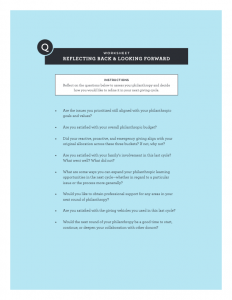The Philanthropy Toolkit
The Stanford PACS Philanthropy Toolkit
The toolkit is a practical step-by-step resource designed to help you, your family, and your advisors engage in thoughtful conversations, be effective in your charitable giving, and anchor your philanthropy around what most deeply inspires you.
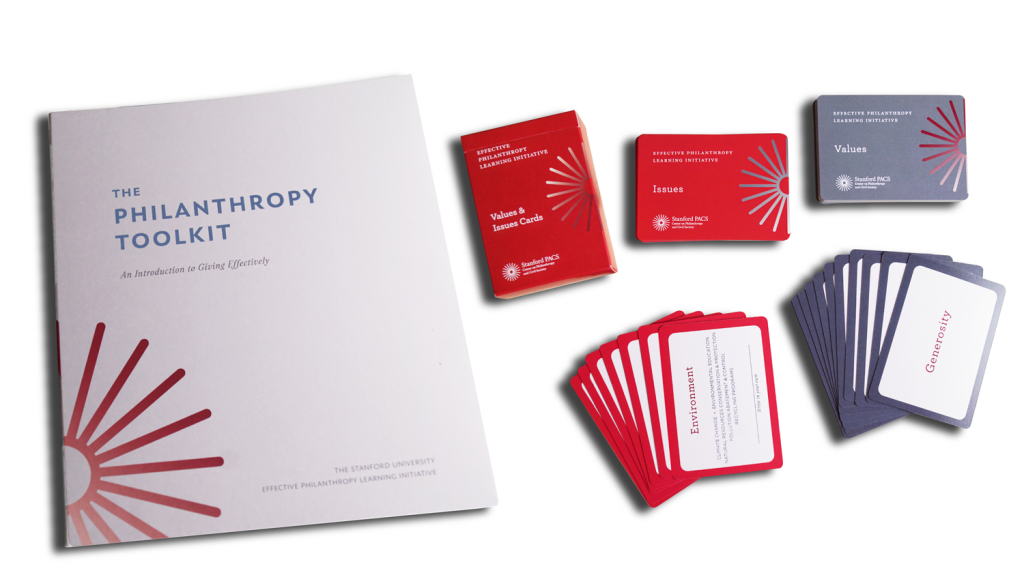
Toolkit Modules
If you wish to cite the Toolkit, please use the following attribution language:
This work is a derivative of “The Philanthropy Toolkit: an Introduction to Giving Effectively” by Stanford Center on Philanthropy and Civil Society, copyright 2020 Board of Trustees of The Leland Stanford Junior University, used under Creative Commons Attribution 4.0 license.
Australian Edition of the Toolkit
EPLI has partnered with Perpetual Asset Management Australia to create an Australian version of the Toolkit available for free online here.
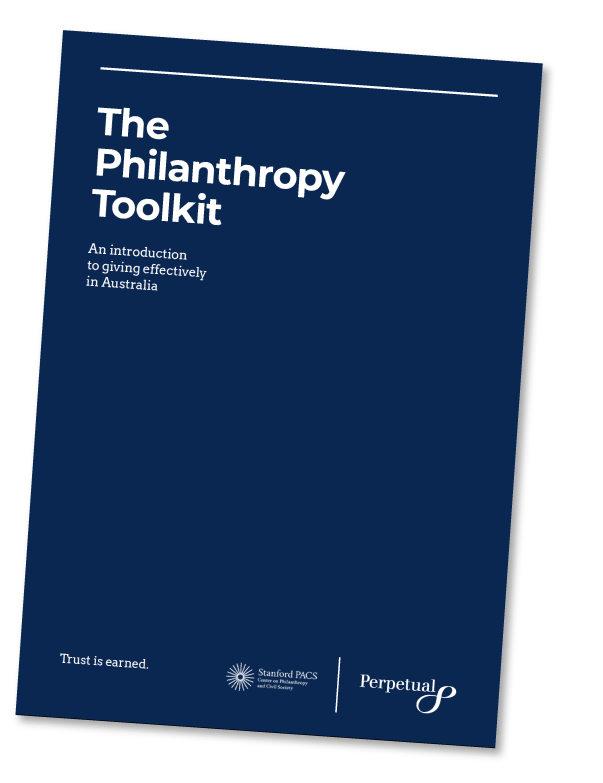
Welcome to the Philanthropy Toolkit
The toolkit contains worksheets, interactive discussion cards, and the EPLI Philanthropy Planner which you can fill out and use on your own or share with your family and advisors. You can do the activities in any order, completing some in an hour and others over a longer timeframe. The best practices reflected in this material are developed from years of Stanford PACS research with donors, wealth advisors, and philanthropy experts. Whether you are new to philanthropy or more experienced, whether you are a donor or an advisor—we’ve designed this resource to help you focus, reflect, and engage in meaningful dialogue and action.
You can work through all 6 modules to create a comprehensive giving plan, or go directly to the areas addressing your current interests. There are components for people who are just starting out in philanthropy and also for those who are more experienced but want to go further.
The activities in this toolkit will help you:
-Identify your core values and focus on the issues you care about
- Develop a giving budget and overall philanthropy plan
- Engage your family and the next generation
- Understand the pros and cons of different giving vehicles
(foundations, donor advised funds, giving circles, etc.)
- Learn where and how to connect with others in the sector
- Understand how to measure and evaluate nonprofits
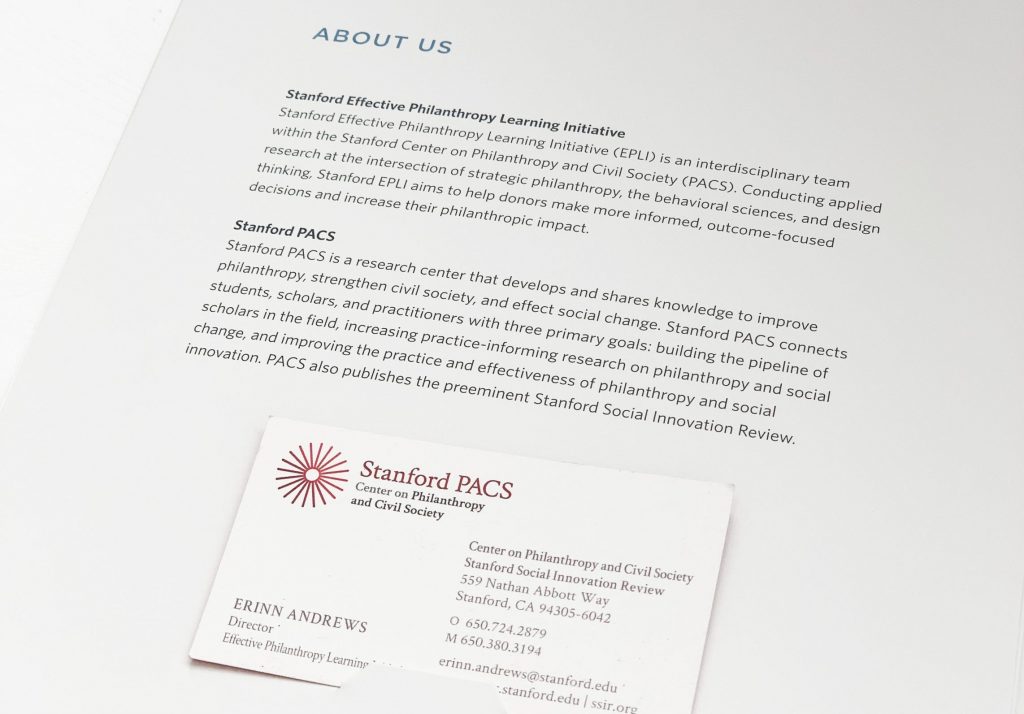
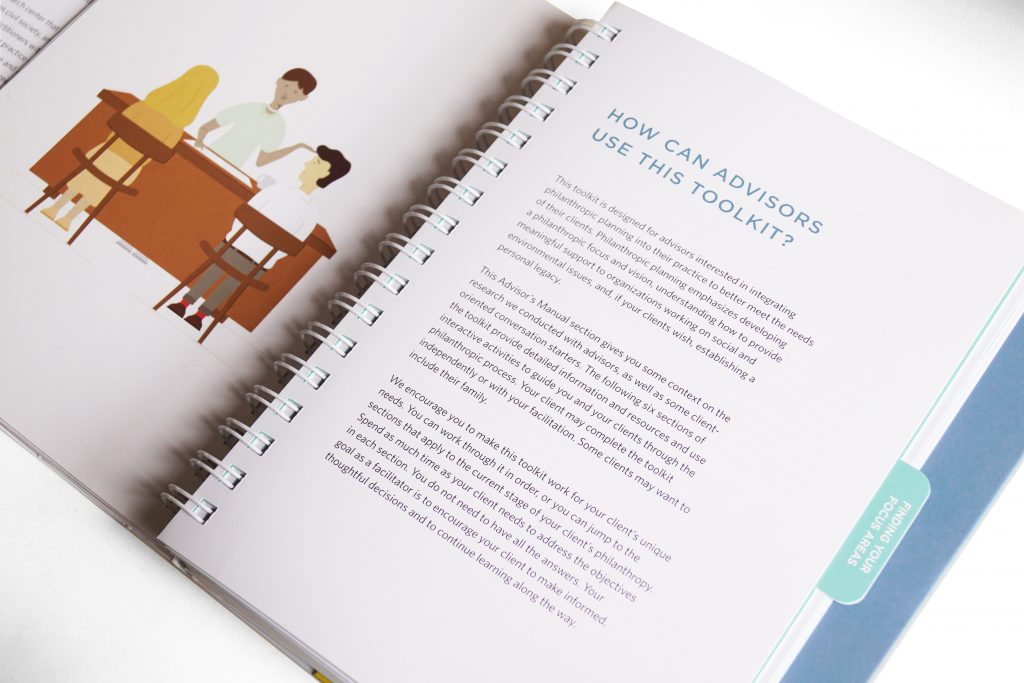
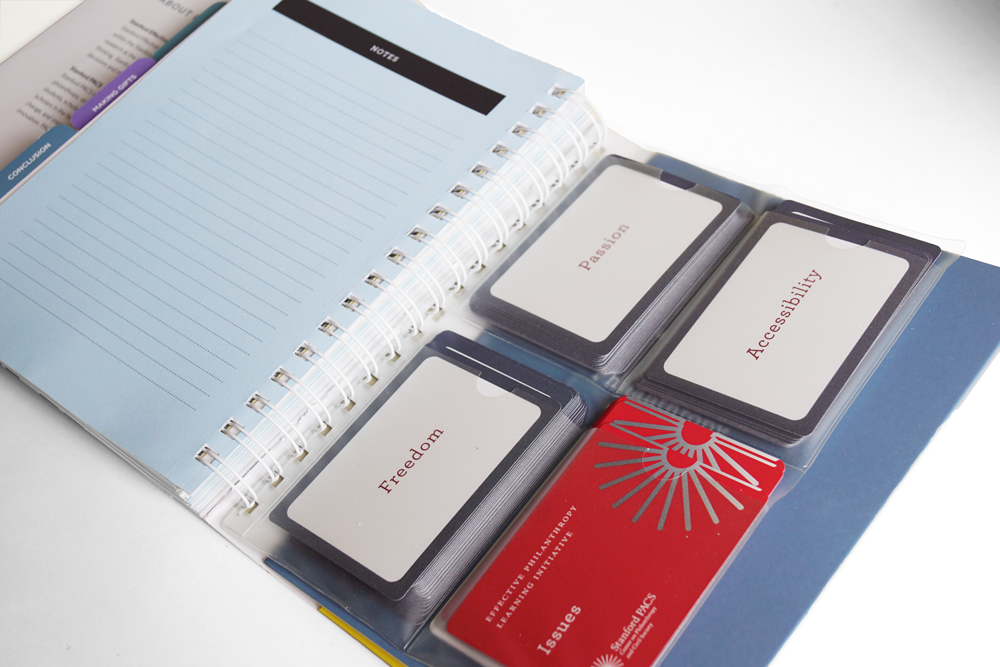
Advisor’s Corner
This is a supplementary section specifically for advisors with a conversation starter to help you guide your client through the content of this toolkit.
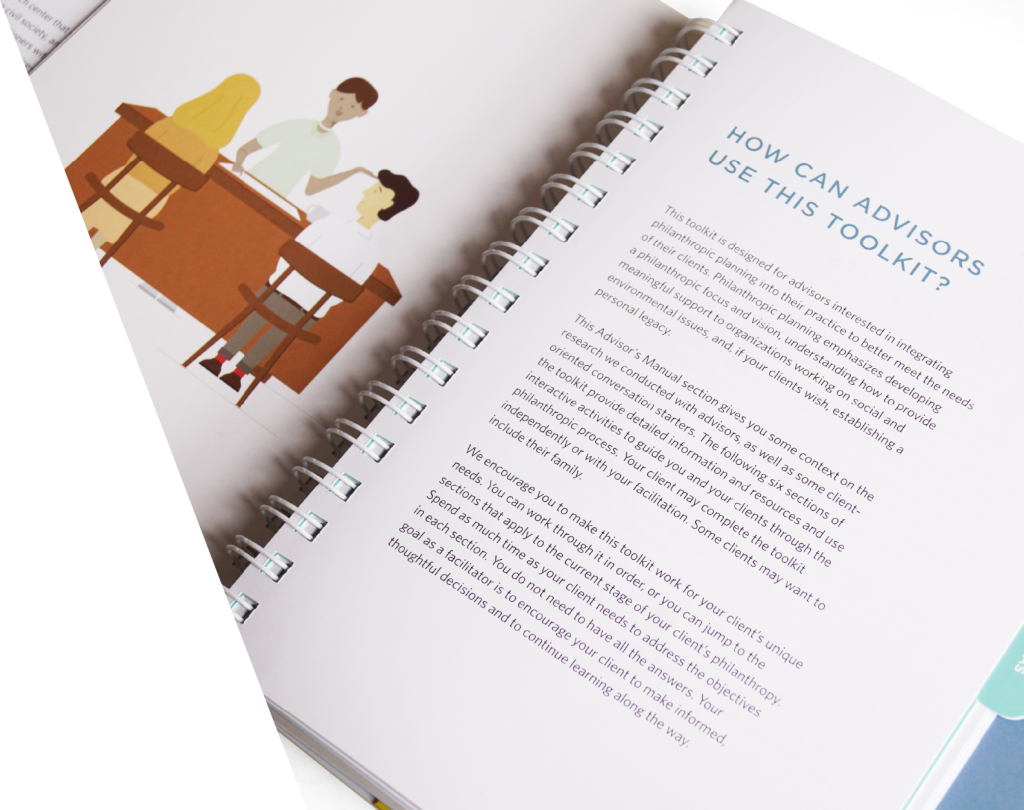
Toolkit Instructions
Who is this for?
This toolkit is designed for high-capacity donors interested in stepping into or continuing their roles as effective philanthropists. Effective philanthropists go beyond writing checks to nonprofit organizations. They are ready to engage in sustained, significant support for effective organizations aligned with their philanthropic missions. This type of giving is personally meaningful as well as socially impactful.
This toolkit is also designed to educate the wide range of professional advisors who help donors manage their assets in alignment with their goals and values, such as wealth advisors, estate planners, tax attorneys, etc. Special materials for advisors can be found under the “Advisor’s Manual” tab.
Note: Nonprofit professionals and other advisors often refer to a segment of donors as “high-net-worth.” However, we believe that net worth is only one asset class. There are situations in which your time, skills, and social capital can be deeply valuable. For this reason, we refer to donors who are interested in significant and sustained support of the nonprofit sector as “high-capacity donors.”
Why use this toolkit?
Creating substantive social impact and maximizing the value of your philanthropic dollars takes careful planning and reflection. Without extensive experience in the social sector, the process can seem overwhelming. This toolkit guides you through each stage of your philanthropic planning, providing you with resources and activities to ensure that your philanthropy can positively contribute to improving the world around you, while also adding more meaning to your own life.
How can you use this Toolkit?
We encourage you to make this toolkit work for your needs and financial situation. You can work through it in order or jump to the specific sections that apply to the current stage of your philanthropy. Some of the activities can be completed in one hour; others may take longer. Spend as much time as you need to achieve the objectives in each section—you do not need to come up with all the answers in a single sitting, or even in a single year.
Working through this toolkit with the guidance of a professional advisor can help you integrate your philanthropic planning into your broader wealth management strategy. Your advisor’s expertise on financial structures and estate planning strategies, as well as knowledge of your personal finances and goals may be helpful at various points in the toolkit.
Our goal is to help you transform your philanthropic vision into action without getting stuck in the planning stage of the process. Many successful philanthropists find it helpful to organize their philanthropy into cycles—they create a three-year or five-year giving plan, use that time to test their plan and learn in the field, then revisit and adapt the plan before continuing the process. We encourage you to create a general timeline for yourself before beginning the toolkit.
We believe that there is no single correct way to be a philanthropist. What matters is that you make informed, thoughtful decisions, and continue learning along the way.
There are two kinds of interactive pages in this toolkit for you to write on if you wish:
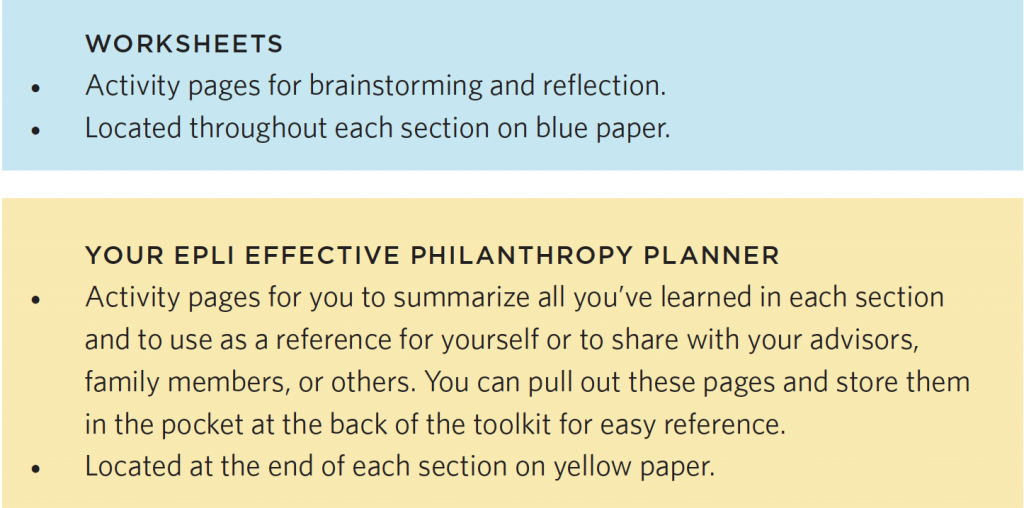
About the Toolkit
The research behind the Toolkit
In the first phase of our project, EPLI interviewed a range of financial intermediaries to better understand where and how to improve philanthropic guidance in the financial planning process. In the second phase, we primarily worked with wealth advisors who often serve as clients’ financial strategists and spend a good deal of time trying to manage all the aspects of a client’s wealth. Though much of this research was conducted with wealth advisors, we believe that the toolkit can prove a valuable resource to many types of advisors who work with clients: wealth advisors, philanthropic advisors, tax attorneys, estate planning lawyers, etc.
In order to help advisors improve their clients’ philanthropic impact, we created several prototypes of possible solutions, including this philanthropy toolkit. The toolkit is intended to help advisors increase their comfort and confidence with supporting and guiding their clients’ philanthropic planning. Through a user-centered design process, we then tested the toolkit prototypes with more than 100 wealth advisors from across the country. These participating advisors are from firms of varying size, experience, and levels of comfort discussing philanthropy with their clients.
An EPLI research paper providing an overview of our research process and the development of the toolkit prototype can be found on the EPLI website: “Helping Wealth Advisors Increase Philanthropic Impact for High Net Worth Clients.”
pacscenter.stanford.edu/epli-publications
Who are we?
The research and design for the first version of this toolkit was completed by EPLI co-founder Nadia Roumani and former EPLI Fellows Sarena Chan, Ayushi Vig, Tina Sadeghi, Gillian Raikes, and Celina Artusi. The second version of this toolkit and its online adaptation was led by Senior Fellow Heather Lord with Ayushi Vig and Interactive Design Fellow Kathryn Davis. Additional thanks go to Paul Brest (EPLI co-founder and Principal Investigator), Erinn Andrews (Director), Davey Kim (Program Manager), and Elyse Lee (Fellow) for supporting the development and launch of this resource.
EPLI’s research and toolkit development were generously supported by the Raikes Foundation, the Bill and Melinda Gates Foundation, Schwab Charitable, and Perpetual. We especially want to thank the Schwab Charitable team for their detailed feedback and ongoing collaboration. We would also like to thank the various experts and financial intermediaries who graciously shared their time and provided us with invaluable feedback.
Conclusion
Congratulations on completing The Philanthropy Toolkit! Engaging in this process of intense reflection, focus, and planning is no simple feat. We hope this approach to philanthropy enriches your giving and paves the way for a lifelong practice of intentional philanthropy—one in which you build upon the lessons you learn along the way, and continually explore how you and your loved ones can deepen your impact on the world. Keep in mind that change takes time—patience is an essential component of the philanthropy journey.
On the following pages you will find additional resources and tools to help you continue your philanthropic learning process in your next giving cycle.
Additionally, EPLI has posted much of this toolkit online and is developing interactive downloadable components for you to use. Visit our website and sign up for email updates to stay informed about new interactive features, modules, and activities.
We would also love to hear your feedback on this toolkit and suggestions for new topics, webinars or other content that would be helpful for you.

